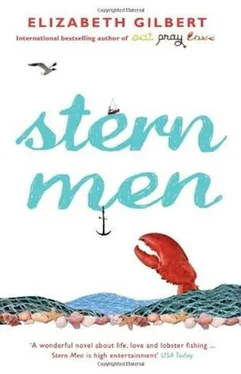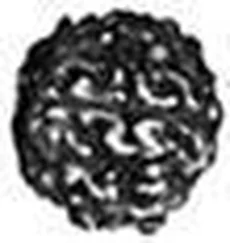He rowed past the New Hope, past all the other boats docked in the harbor, never easing his pace. His knuckles on the oars were white, and his mouth was a tight, concentrated line. Ruth held on to both sides of the boat, once again amazed at his strength. This was not at all what she’d expected to be doing about thirty seconds ago, when she was standing on the dock. Owney rowed until they were out of the protected cove, and the waves had become swells that bounced and rocked against the little rowboat. They reached a huge granite rock-a small granite island, really-and he steered the boat behind it. They were completely out of sight of the shore. Waves lapped at the rock.
Owney stared ahead at the ocean, frowning and breathing heavily. He rowed away from the island, into the sea about forty feet, and stopped. He stood up in the rowboat and peered into the water, then sat down and rowed another ten feet, and peered into the water again. Ruth leaned over but saw nothing.
Owney Wishnell reached to the bottom of the rowboat for a fishing gaff, a long stick with a hook at one end. Slowly, he dipped it in the water and started to pull, and Ruth saw that he’d snagged the gaff on a buoy, like the ones lobstermen used for marking where they’d set traps. But this buoy was plain white, with none of the lobstermen’s bright identifying colors. And instead of bobbing on the surface, the buoy was on a short line, which kept it hidden several feet below. Nobody could have found it without knowing exactly, precisely, where to look.
Owney threw the buoy into the boat and then, hand over hand, pulled the line it was attached to until he reached the end. And there was a handmade wooden lobster trap. He heaved it aboard; it was packed with huge, snapping lobsters.
“Whose trap is that?” Ruth asked.
“Mine!” Owney said.
He flicked open the trap door and pulled out the lobsters, one by one, holding up each for Ruth to see and then tossing it into the water.
“Hey!” she said after the third one. “Don’t throw them back! They’re good!”
He threw them back, every one. The lobsters were indeed good. They were enormous. They were packed in that trap like fish in a deep-sea net. They were, however, behaving oddly. When Owney touched them, they didn’t snap or fight. They lay still in his hand. Ruth had never seen anything like these obedient lobsters. And she’d never seen anything close to this many in a single trap.
“Why are there so many? Why don’t they fight you?” she asked.
“Because they don’t,” he said. He tossed another one in the ocean.
“Why don’t you keep them?” Ruth said.
“Can’t!” Owney cried.
“When did you set the trap?”
“Last week.”
“Why do you keep the buoy under water, where you can’t see it?”
“Hiding it.”
“From who?”
“Everyone.”
“How did you find the trap, then?”
“I just knew where it was,” he said. “I know where they are.”
“ ‘They’?”
He threw the last of the lobsters into the sea and tossed the trap over the side with a mighty splash. As he wiped his hands on his overalls, he said, with tragic urgency, “I know where the lobsters are.”
“You know where the lobsters are.”
“Yes.”
“You really are a Wishnell,” she said. “Aren’t you?”
“Yes.”
“Where are your other traps, Owney?”
“Everywhere.”
“Everywhere?”
“All over the coast of Maine?”
“Yes.”
“Your uncle knows?”
“No!” He looked aghast, horrified.
“Who built the traps?”
“Me.”
“When?”
“At night.”
“You do all this behind your uncle’s back.”
“Yes.”
“Because he’d kill you, right?”
No answer.
“Why do you throw them back, Owney?”
He put his hands over his face, then let them drop. He looked as if he was about to cry. He could only shake his head.
“Oh, Owney.”
“I know.”
“This is crazy.”
“I know.”
“You could be rich! My God, if you had a boat and some gear, you could be rich!”
“I can’t.”
“Because somebody-”
“My uncle.”
“-would find out.”
“Yes.”
“He wants you to be a minister or something pathetic like that, right?”
“Yes.”
“Well, that’s a big fucking waste, isn’t it?”
“I don’t want to be a minister.”
“I don’t blame you, Owney. I don’t want to be a minister, either. Who else knows about this?”
“We have to go,” Owney said. He grabbed the oars and spun the boat around, his broad, straight back toward the shore, and started to pull through the water in his beautiful long strokes, like a gorgeous machine.
“Who else knows, Owney?”
He stopped rowing and looked at her. “You.”
She looked right back at him, right at his big, square blond head, at his blue Swedish eyes.
“You,” he repeated. “Only you.”
As the lobster increases in size, it grows bolder and retires farther from shore, although it never really loses its instinct for digging, and never abandons the habit of concealing itself under stones when the necessity arises.
– The American Lobster: A Study of Its Habits and Development Francis Hobart Herrick, Ph.D. 1895
GEORGES BANK, at the end of the Ice Age, was a forest, lush and thick and primeval. It had rivers, mountains, mammals. Then it was covered by the sea and became some of the finest fishing ground on earth. The transformation took millions of years, but it didn’t take the Europeans long to find the place once they reached the New World, and they fished the hell out of it.
The big boats sailed out with nets and lines for every kind of fish-redfish, herring, cod, mackerel, whales of many varieties, squid, tuna, swordfish, dogfish-and there were draggers, too, for scallops. By the end of the nineteenth century, the bank had became an international city afloat; German, Russian, American, Canadian, French, and Portuguese boats all pulled up tons of fish. Each boat had men aboard to shovel the flopping fish into the holds as thoughtlessly as men shovel coal. Each vessel stayed out there for a week, even two weeks at a stretch. At night, the lights from the hundreds of ships shone on the water like the lights of a small city.
The boats and ships out there, stuck in the open sea, a day from any shore, were sitting targets for bad weather. The storms came up fast and mean and could wipe out a whole fleet, devastating the community it came from. A village might send a few fishing boats out on a routine trip to Georges Bank and a few days later find itself a village of widows and orphans. The newspapers listed the dead men and their surviving dependents, too. This was perhaps the crux of the tragedy. It was imperative to count who was left, to estimate how many souls remained on shore without fathers, brothers, husbands, sons, uncles to support them. What was to become of them?
46 DEAD, the headline would read. 197 DEPENDENTS LEFT BEHIND.
That was the truly sad number. That was the number everyone needed to know.
Lobster fishing is not like this, though, and never was. It is dangerous enough, but it isn’t as deadly as deep-sea fishing. Not by a long shot. Lobster towns don’t lose men in battalions. Lobstermen fish alone, are rarely out of sight of shore, are generally home by early afternoon to eat pie and drink beer and sleep with their boots on the couch. Widows and orphans are not created in crowds. There are no unions of widows, no clutches of widows. Widows in lobster-fishing communities appear one at a time, through random accidents and freak drownings and strange fogs and storms that come and go without doing other havoc.
Читать дальше









